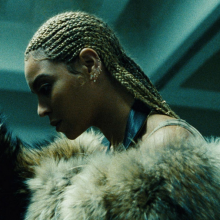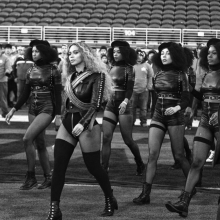beyonce
TO ENTER THE main history galleries of the Smithsonian’s National Museum of African American History and Culture (NMAAHC), you have to descend. A glass elevator carries you down through six centuries of history, dates written on walls like exposed strata in the earth. The past, we are reminded, lies not behind us but beneath us.
The weight of your passage and what lies ahead does not hit you until you step out of the elevator and emerge to the 1400s. You have arrived in a trans-Atlantic world as yet unmade, a geography not yet drawn by greed, suffering, and death. You will return to the surface and the present slowly, and only by walking the mile-and-a-half-long exhibition corridor on a winding route through slavery to an unsecured freedom.
No matter how many times I take this journey, it never becomes familiar.
The emotional shock of history is too great, contained in the thousands of everyday items on display: tiny, child-sized shackles; pieces of an excavated slave ship; an entire slave cabin, transplanted from South Carolina; a small silver box that held one man’s treasured possession, his free papers; Harriet Tubman’s lace shawl, given to her by Queen Victoria. Emmett Till’s casket.
NMAAHC, or the “Blacksonian,” as I like to call it, makes explicit what is sometimes only gestured to by other institutions: the sacredness of history.
From the depiction of the divine mother in Beyonce’s imagery to Busta Rhymes’s jab at President Trump’s “Muslim ban,” religion took center stage at the 2017 Grammy Awards.
As he accepted the first award – for best new artist – of the televised broadcast on Feb. 12, Chance the Rapper declared:
“Glory be to God. I claim this victory in the name of the Lord.”
Since Beyoncé released "Formation," white, mainstream outlets have been referring to her evolution as "militant." But Bey is an entertainer and artist. She is not in anyone's home to decide who turns off the TV or internet. She is not militant. She is defiant. But America is so used to demanding the compliance of black women that defiance is often confused for being militant.
But when others don't understand who we are or how we are shaping the world, Beyoncé has already told us how to respond: "I ain't sorry. I ain't sorry. I ain't sorry. I ain't thinkin' bout you."
I'm not either, Bey. Now, where is Serena so I can twerk with her and drink this chilled lemonade?

Still from HBO's LEMONADE. Via Facebook.
With the April 23 release of LEMONADE, Beyoncé’s full-length visual album, I am convinced more than ever that “Formation” served as voice crying out on the internet, paving the way for even more conversations about the mistreatment, invisibility, and spiritual essence of black women.
Rev. Michael Piazza is well known for developing Dallas’s Cathedral of Hope, the first predominantly LGBT church in the country. The Cathedral of Hope grew from a store-front church into a megachurch with a message of inclusivity, love, and justice. I am taking a class taught by Rev. Piazza this semester, and with us he recently shared a compelling insight. Rev. Piazza believes that America will have another Great Awakening.
I think that the time for that awakening could be right now, and Beyoncé’s documentary does a stellar job of showing us why.
The white power structures were offended, so they fought back. Fox News interviewed Rudy Giuliani about the halftime show. The interview is a textbook case in America’s 400-year history of silencing black voices. The segment shows four white people critiquing Beyoncé’s performance and the black lives matter movement. They lectured Beyoncé on her performance. One commentator said, “In the end we find out that Beyoncé dressed up in a tribute to the Black Panthers, (the dancers) went to a Malcom X formation, and the song, the lyrics, which I couldn’t make out a syllable, were basically telling cops to stop shooting blacks!”
How many centuries were our black brothers and sisters relegated to the position of audience — the thrills of competitive sports, television and movie screens, even the petty dramas of middle class servitude demanding their attention? We gave them the role of witness to our stories without so much as a thought that they might have their own. Today those stories are rising to be told and though we may be the villain or not so much as a paragraph, if we listen, it will be our great joy to learn all that we have missed.

Image via Twitter/@cjnlewis
“The potency of ‘Formation’ doesn’t comes from its overt politics: it comes from the juxtaposition of lyric with the images, which organically present black humanity in ways we’ve haven’t seen frequently represented,” wrote Syreeta McFadden in The Guardian.
“Beyoncé’s work shows that revolution can be beautiful; protest and celebration are not contradictions when imagining a black future that isn’t overrun by images of black pain and death.”
The year 2013 may well come to be known as the Year of the Woman.
Women of high socio-economic status both applauded and lamented the publication of Sheryl Sandberg’s Lean In, while women of a certain age waxed nostalgic over the 50th anniversary release of Betty Friedan’s The Feminine Mystique. Those under 30 were surprised that the latter book existed, and those in their middle years realized the reading assignment that somewhat bored them as inapplicable in college was now vitally important, as they struggled with work/life balance and debated whether to stay home with the kids or remain in the paid workforce.
The “mommy wars” raged, and were fueled by controversial statements and work policies by women in positions of leadership. Stay-at-home moms and paycheck-earning moms stared one another down across a divide narrower than they realized, and bloggers everywhere called for a united female front.
Maybe you are like me and you need a bit of good news this week, because it’s been a week of bad news. There was the tragic shooting at the Navy Yard, leaving 12 people killed. Then there were the racist comments about the new Miss America, Nina Davuluri. She is the first person of Indian descent to be crowned Miss America, yet the news of the event emphasized racist tweets. It was almost as if people were competing over who could be the most racist: Some referred to her as “the Arab,” and other tweets claimed, “this is America, not India,” and one even called her “Miss 7-11.” Not to mention the continuing escalation of tensions throughout the world involving Syria.
It was a depressing beginning to the week. I mimetically absorbed much of this violence, hatred, and racism. Misanthropy settled into my soul and I began to loathe myself and the entire freakin’ human race.
But then I saw this video of Beyoncé performing in Brazil, and my hope in humanity was restored.
Super Bowl halftime shows often burn more vivid images into the American conscience than the most-watched football game of the year, and can claim millions more viewers.
They can also ignite controversy, as Janet Jackson did with her halftime “wardrobe malfunction” in 2004. Last year, performing with Madonna, British-born hip-hop star M.I.A. gave the finger to 114 million people.
Outraged by the raunchy behavior, or simply to capture some of the Super Bowl’s supersized audience, some religious programmers are now producing halftime shows of their own.







